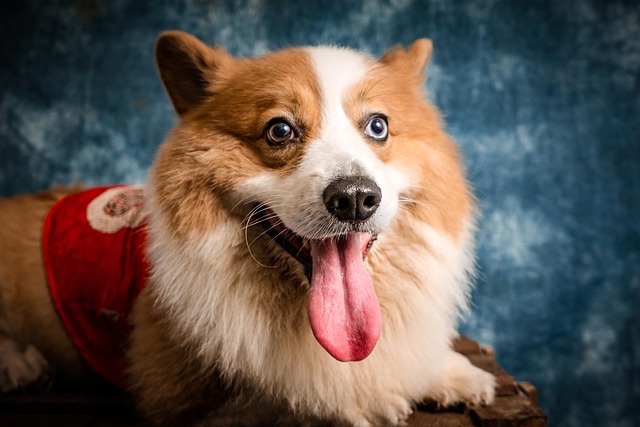
How can I tell if my dog's heatstroke is serious
Let’s be real: It’s a sticky August morning in Los Angeles, and you took your 2-year-old Golden Retriever, Max, for a walk a little later than usual
Hey corgi parents! If your fluffy buddy's snuggles come with an unwelcome smell, you’re in the right place. Let’s tackle that odor with practical, vet-approved tips—keeping your pup fresh while honoring our role as responsible pet owners in our communities.
Corgis have double coats, floppy ears, and cute skin folds—all of which trap moisture, dirt, and bacteria. Their skin’s natural oils mix with these to create odor over time. Regular care can prevent this, but first, let’s dive into solutions.
Grooming is the foundation of keeping your corgi fresh. Brush 2-3 times weekly to remove debris and distribute skin oils. Use a slicker brush for their dense undercoat to prevent matting and reduce trapped dirt that causes smells. When it comes to bathing, don’t overdo it! Every 4-6 weeks (or post-muddy adventure) with a gentle, pH-balanced dog shampoo is ideal. Human products disrupt skin health—opt for vet-recommended formulas compliant with local pet care regulations. Rinse thoroughly to avoid residue that irritates skin and attracts odor.
Their ears and skin folds are high-risk zones for odor. Flopy ears lack airflow, making infections common. Clean weekly with vet-approved solution: wipe the outer ear (never the canal) with a cotton ball. If you notice strong smells, redness, or scratching, see a vet—these are signs of infection. For skin folds, gently clean wrinkles with a damp cloth or pet wipe, then dry fully. Moisture here breeds bacteria. If irritation occurs, ask your vet about safe creams or powders to keep the area dry and odor-free.
 Believe it or not, diet plays a big role in how your corgi smells. A quality diet equals healthy skin. Look for kibble with omega-3s (salmon, flaxseed) to reduce inflammation and promote a shiny coat. Add a tiny fish oil dose (vet-approved!) for extra skin support. Avoid fillers and artificial additives—they can trigger allergies and stinky skin. If itching or digestive issues arise, consider hypoallergenic options.
Believe it or not, diet plays a big role in how your corgi smells. A quality diet equals healthy skin. Look for kibble with omega-3s (salmon, flaxseed) to reduce inflammation and promote a shiny coat. Add a tiny fish oil dose (vet-approved!) for extra skin support. Avoid fillers and artificial additives—they can trigger allergies and stinky skin. If itching or digestive issues arise, consider hypoallergenic options.
Dental health is often overlooked but crucial. Bad breath isn’t just gross—it’s a red flag. Brush teeth 2-3 times a week with dog toothpaste (never human!). Dental chews or toys help scrape plaque. Annual vet dental checks prevent tartar buildup, which releases smelly bacteria into the body.
The environment your corgi lives in also matters. Wash their bedding weekly in gentle, pet-safe detergent. Vacuum floors and furniture often to remove fur and dander that hold odors. Outdoors, ensure dry resting spots—wet grass and mud cling to fur. Use household cleaners free of harsh chemicals; many irritate dogs’ respiratory systems and skin.
If you’ve tried all these steps and the odor persists, it’s time to see the vet. Persistent odor can be a sign of underlying health issues like allergies, infections, or endocrine problems. Don’t wait—your vet can test for conditions like yeast infections or thyroid issues that need medical treatment. Responsible ownership means addressing root causes, not just masking smells.
By blending these steps—smart grooming, targeted care for trouble spots, a healthy diet, a clean environment, and regular vet check-ins—you’ll enjoy a happier, healthier corgi who smells as sweet as they look. Remember, small routines make a big difference in their comfort and our bond. Let’s keep those snuggles delightful—no odor required!

Let’s be real: It’s a sticky August morning in Los Angeles, and you took your 2-year-old Golden Retriever, Max, for a walk a little later than usual

You're enjoying a summer afternoon at the park when you notice your dog has stopped panting and appears disoriented - their gums are bright red

Let’s paint the picture: You’re in your Denver apartment, watching your 4-year-old Boston Terrier, Ruby, plop down mid-play session with her favorite toy

Many dog owners notice their pets nails seem shorter after regular walks,but how much does this daily activity actually help?The answer depends on where you walk—concrete sidewalks or asphalt streets gently file nails as a dog's paws hit the ground

Most dog owners notice their pup scooting across the carpet at some point, but few connect it to impacted anal glands. These small sacs near a dog’s rectum secrete a scent for marking territory

Most vets agree that regular dog teeth cleaning is key to avoiding painful dental issues later. For healthy adult dogs, a professional cleaning at the vet’s office every 12 to 18 months usually works well.